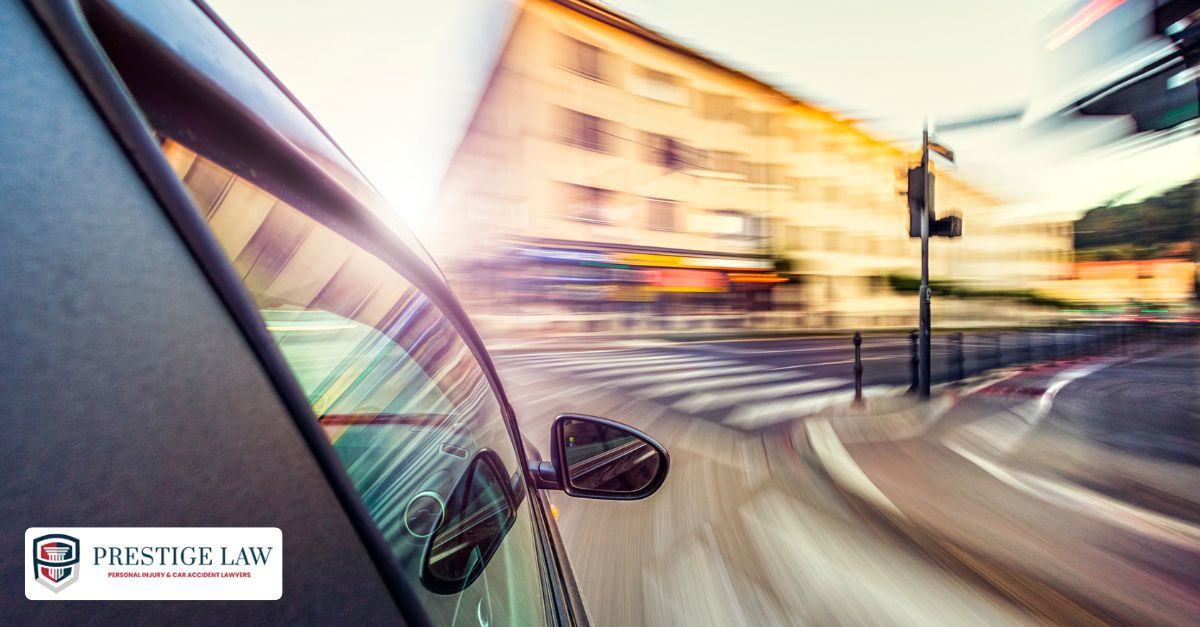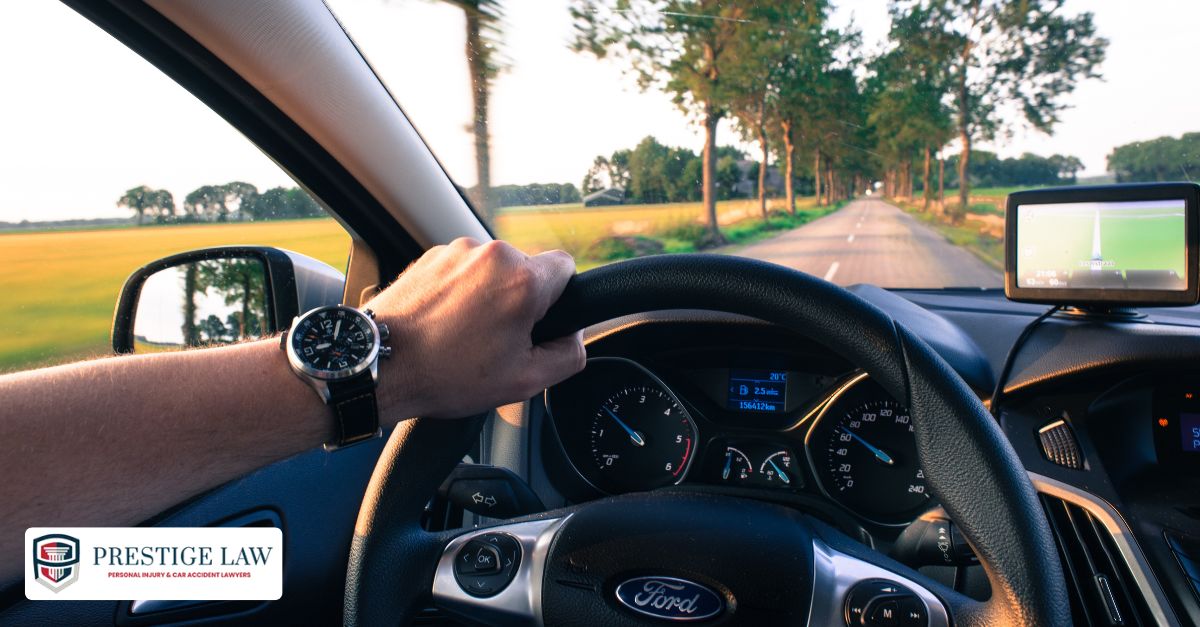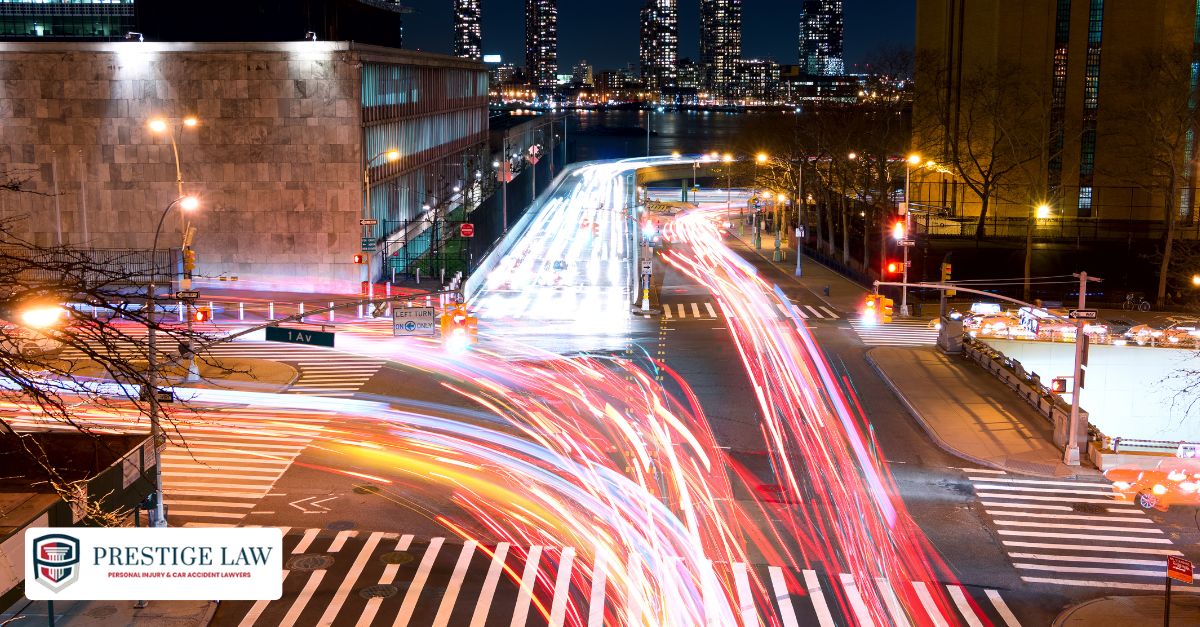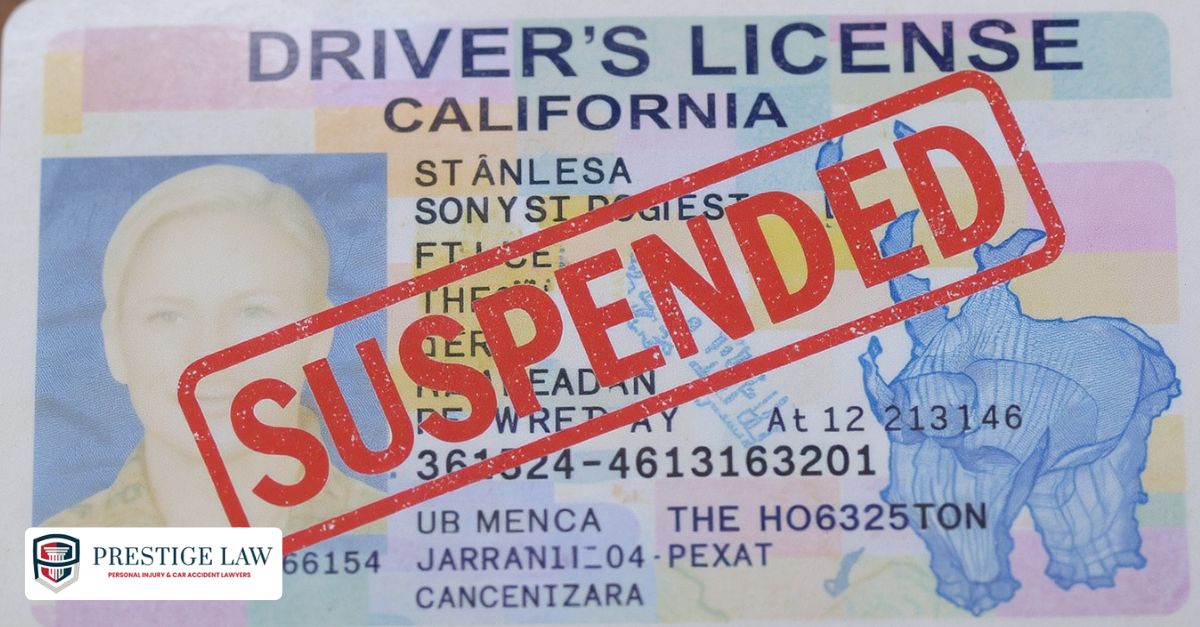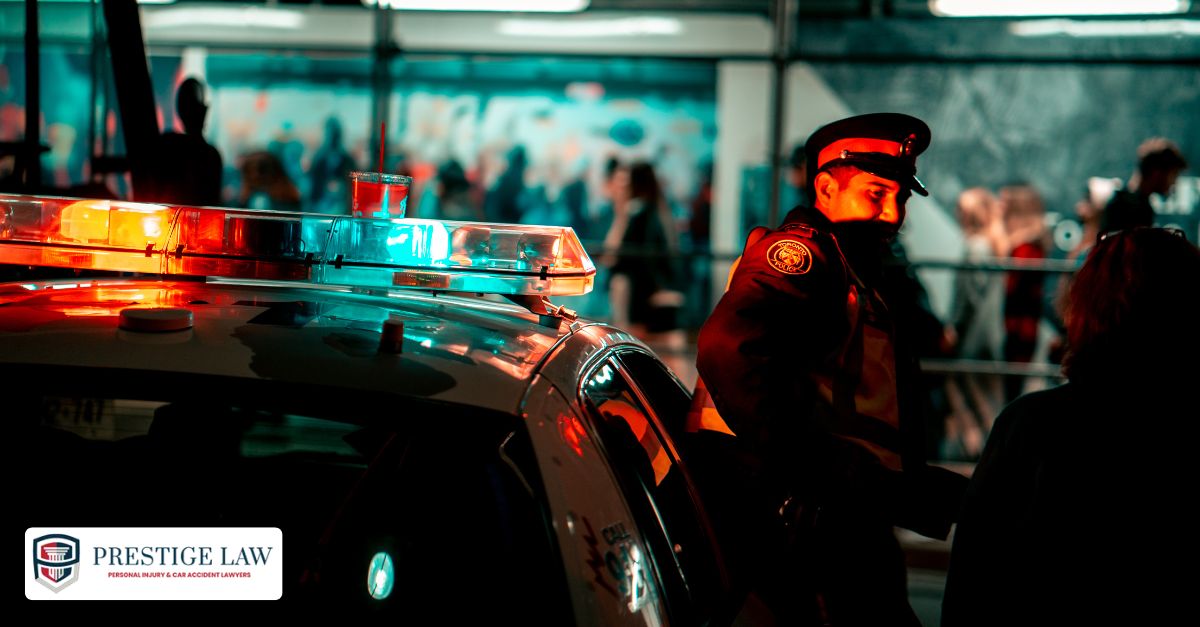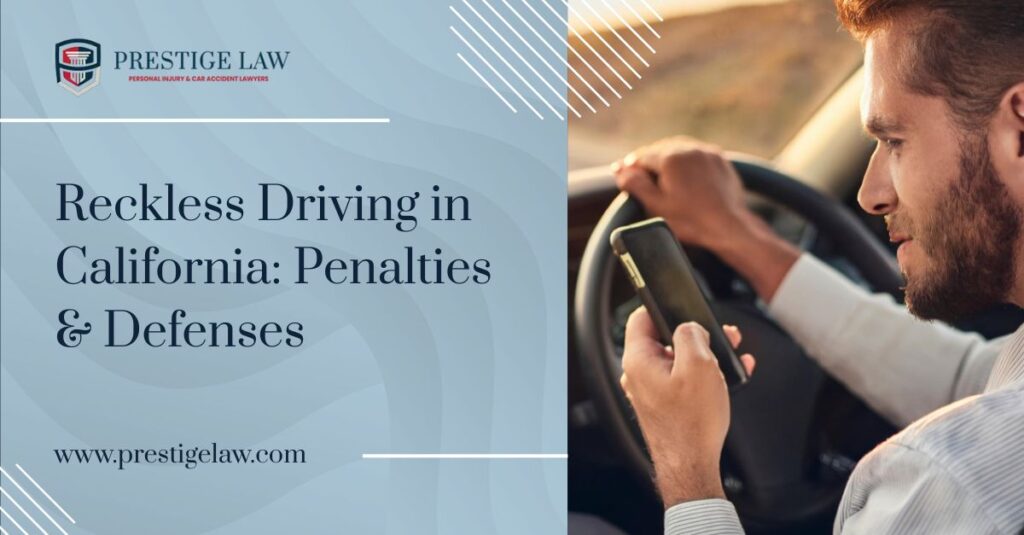
What Happens If You’re Caught Reckless Driving in California?
Published on / Category: California Driving Laws
You didn’t mean to break the law—but now you’re facing a reckless driving charge. In California, this isn’t just a traffic ticket. It’s a criminal misdemeanor.
A conviction can lead to jail time, a suspended license, and steep insurance hikes. It also stays on your record—sometimes for years.
What many drivers don’t realize is how quickly everyday actions—like weaving through traffic or missing a stop sign—can be seen as “willful disregard for safety.” That’s the legal threshold for reckless driving in California.
This guide explains what that means under state law, how it differs from careless driving, what penalties to expect, and how to protect yourself in court.
If you’ve been charged—or you’re trying to avoid one—this breakdown is for you.
At a Glance:
In California, reckless driving is a misdemeanor criminal charge. It involves driving with willful disregard for safety—like speeding, racing, or aggressive lane changes. Penalties can include jail time, fines, license suspension, and a permanent record. Defenses may include lack of intent, emergency situations, or mistaken identity. With the right lawyer, it’s possible to reduce or beat the charge.
What is reckless driving in California?
Reckless driving in California isn’t just about going over the speed limit. It’s about how you drive—and the danger your actions create for others.
Under California Vehicle Code §23103, the law defines reckless driving as:
“A person who drives a vehicle upon a highway in willful or wanton disregard for the safety of persons or property.”
Let’s break that down.
“Willful or wanton disregard” means you weren’t just careless—you knew your actions were risky but did them anyway. It’s about ignoring the potential harm, not making a mistake.
“Persons or property” means you don’t need to hit another car to be charged. Swerving near pedestrians, damaging fences, or creating a near-miss incident can still count as reckless driving.
What’s the difference between careless and reckless driving?
These terms may sound similar, but California law treats them very differently.
Careless driving (also known as negligent or inattentive driving) happens when someone makes an unintentional mistake—like forgetting to signal, rolling through a stop sign, or driving while distracted. It lacks intent.
Reckless driving involves choice. The driver knows the behaviour is dangerous and does it anyway. That’s why it’s a criminal charge and not just a traffic infraction.
Common Examples of Reckless Driving Behavior
Reckless driving isn’t limited to one action. It’s a pattern of behavior that shows disregard for the safety of others on the road.
Whether the behavior is intentional or simply careless, it puts people at risk—and California law takes it seriously.
Here are some of the most common actions that may lead to a reckless driving charge:
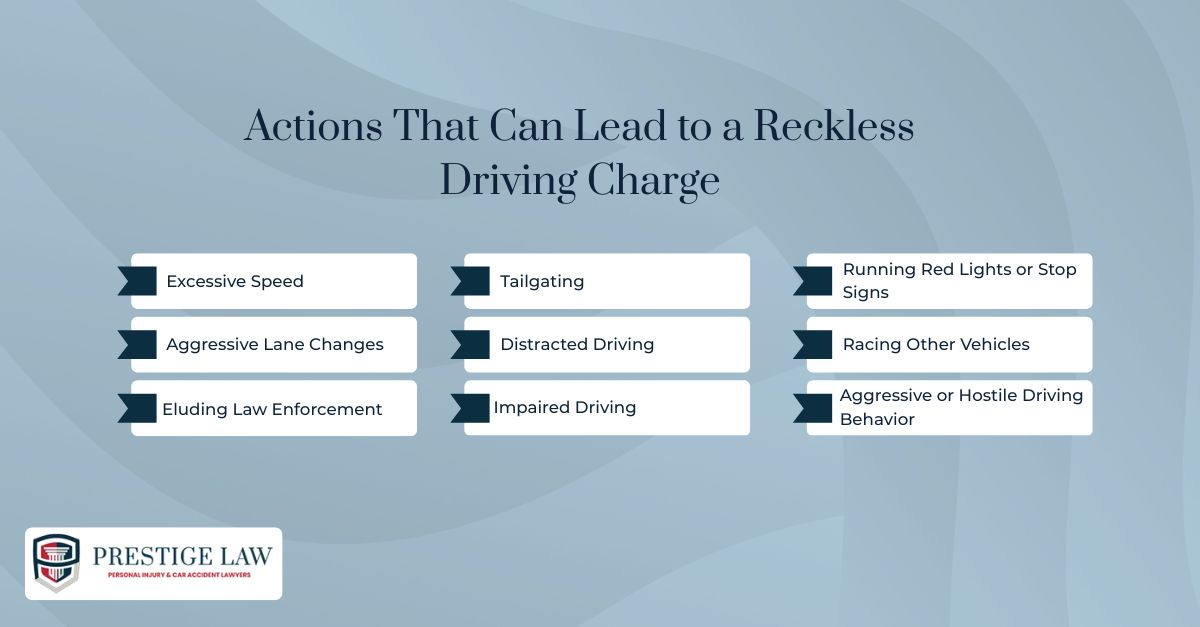
Excessive Speed
Driving far above the speed limit reduces your control and reaction time. Even if you’re “keeping up with traffic,” speeds 15 mph or more over the limit—especially in poor weather or dense traffic—can be charged as reckless driving.
If speeding causes a crash, the risk of criminal penalties increases sharply.
Tailgating
Following too closely leaves no room to brake safely. Rear-end collisions are common on California roads, and tailgating is often to blame.
It also increases stress for other drivers and can lead to road rage. Stick to the three-second rule to keep a safe distance.
Running Red Lights or Stop Signs
Blowing through a red light or rolling a stop sign may save seconds—but it puts everyone at risk, especially in busy intersections.
Police often see this behavior as evidence of either aggression or inattention—both of which can support a reckless driving charge.
Aggressive Lane Changes
Weaving through traffic, cutting people off, or turning without signaling makes crashes more likely.
Failing to check blind spots or giving drivers time to react raises the danger. This type of maneuver can quickly shift from careless to criminal.
Distracted Driving
Texting, eating, adjusting music—these all shift your attention away from the road.
If distraction leads to unsafe behavior like swerving or late braking, it may qualify as reckless driving. Drivers should always be aware of the dangers of distracted driving.
Racing Other Vehicles
Street racing—even unplanned “spur of the moment” races—often involves high speeds, illegal maneuvers, and total disregard for safety.
If caught, drivers may face large fines, vehicle impoundment, and jail time. One wrong move can be fatal.
These high-risk behaviors are often linked to illegal events like street races or takeovers. Many drivers ask, what is a street takeover? It’s when groups block intersections or highways to perform stunts like donuts and drifting—conduct that often results in reckless driving charges, vehicle impoundment, and even criminal penalties.
Eluding Law Enforcement
Trying to flee from police during a traffic stop or incident is treated as extremely dangerous.
Chases put the driver, police, and public at risk—and can result in additional charges stacked on top of reckless driving.
Impaired Driving
Driving under the influence of alcohol or drugs may result in a DUI—but even if it’s reduced, prosecutors may pursue a reckless driving charge instead.
This is common in plea deals and still carries criminal penalties, including fines and a record. It also affects insurance and driving privileges.
Aggressive or Hostile Driving
Road rage can turn a minor incident into a legal crisis. Common examples include:
- Brake-checking tailgaters
- Deliberately blocking lanes
- Shouting or honking in anger
- Forcing another driver off the road
- Throwing objects or hitting another vehicle
These acts may lead to charges beyond reckless driving, depending on the outcome.
Penalties and Consequences of Reckless Driving
Reckless driving in California isn’t just a traffic violation—it’s a criminal offense. A conviction can impact your freedom, finances, and driving record for years.
Here’s what you need to know.
First Offense (Misdemeanor)
For a first-time reckless driving charge under California Vehicle Code §23103, you could face:
- Up to 90 days in county jail
- Fines ranging from $145 to $1,000
- Two points on your DMV driving record
- A permanent criminal record
- Auto insurance increases—sometimes as high as 184%
In some cases, a judge may offer probation, community service, or traffic school instead of jail. But these options are not guaranteed.
A conviction can also affect your insurance coverage. In some cases, reckless driving may lead to questions about liability and whether third party insurance will cover damages, especially if multiple vehicles or pedestrians are involved.
Repeat Offenses
California takes repeat reckless driving seriously. If you’ve already been convicted once, the consequences escalate quickly.
A second conviction can result in:
- Increased fines
- Up to 90 days in county jail
- A license suspension of up to 60 days
A third conviction may lead to:
- Additional jail time
- Higher fines
- A license suspension of up to six months
In addition to penalties ordered by the court, reckless driving adds two points to your record under Vehicle Code §12810.5. If you accumulate too many points, the DMV may classify you as a negligent operator, which can trigger an automatic suspension:
- 4 points in 12 months
- 6 points in 24 months
- 8 points in 36 months
Even a single reckless driving conviction can put you over the threshold—especially if you have prior infractions on your record.
Injury-Related or Aggravated Reckless Driving
Under Vehicle Code §23104, reckless driving that causes bodily injury to someone other than the driver is a criminal offense with enhanced penalties.
If convicted, you may face:
- County jail time of 30 days to 6 months
- Fines between $220 and $1,000
- Or both jail time and fines
While this is still a misdemeanor, prosecutors and judges take injury-related cases more seriously. If additional factors are present—like prior convictions, DUI involvement, or intentional harm—the case could be escalated even further.
“Wet Reckless” Plea Deals (DUI-Related)
In DUI cases, a driver may be able to negotiate the charge down to a “wet reckless.”
This is still a criminal offense. It will appear on your record and may be treated as a prior DUI in future cases.
That means steeper penalties if you’re arrested again.
You may also face:
- Probation
- Mandatory alcohol education programs
- Sharp increases in insurance premiums
“Wet reckless” is often the lesser of two evils, but it’s not a free pass.
Legal Defenses Against Reckless Driving Charges
Being charged with reckless driving in California is serious—but not hopeless. The prosecution must prove you acted with intent and ignored the safety of others.
That’s a high bar. A skilled defense lawyer can challenge that claim using several proven strategies.
In some cases, the defense may also involve proving compliance with equipment and vehicle standards, such as legal tint in California or proper safety modifications. Officers sometimes cite drivers for reckless driving alongside tint or modification violations, but showing compliance with state law can weaken the prosecution’s case.
Here are common legal defenses that may apply:
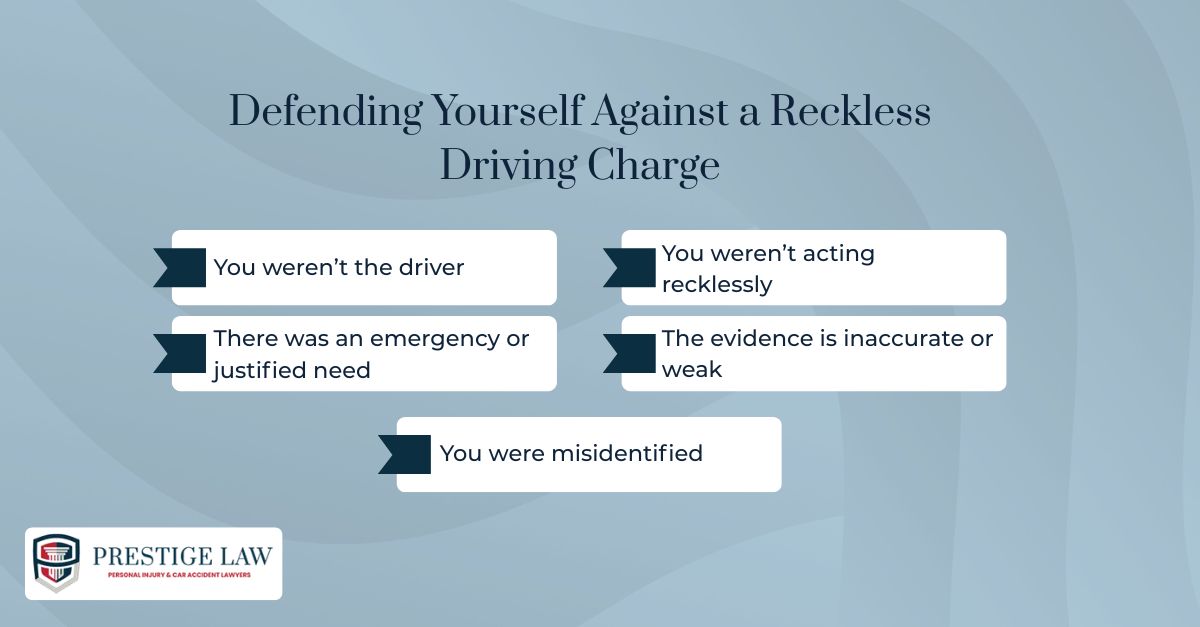
You Weren’t the Driver
You can’t be convicted if you weren’t behind the wheel. This defense is especially useful in cases involving unclear reports, red-light cameras, or multiple vehicles.
If the prosecution can’t prove you were the driver, the case may not stand.
You Weren’t Acting Recklessly
Not all risky behavior qualifies as “reckless.” For the charge to stick, prosecutors must show that you willfully created a serious risk—not that you were simply distracted.
For example, briefly checking your GPS or texting while driving may show negligence—but that’s not enough for a reckless driving conviction. Prosecutors often conflate distracted driving with willful misconduct, but the two are legally distinct. Even after a texting and driving accident, intent still matters.
There Was an Emergency
California law allows for a necessity defense. If you ran a red light to avoid a crash or sped to get someone to a hospital, your actions may be considered justified.
In urgent situations, the law recognizes that breaking a rule may have been the safest option available.
The Evidence Is Weak or Inaccurate
Many reckless driving charges rely on officer observations or radar devices. But those can be flawed.
Your attorney may challenge:
- The accuracy of radar or dashcam footage
- Conflicting witness statements
- The officer’s interpretation of your actions
Even small inconsistencies can be enough to raise doubt.
You Were Misidentified
In heavy traffic, it’s possible for police to mistake one driver for another—especially if several vehicles were involved.
Your lawyer can use surveillance footage, GPS data, or witness testimony to prove you weren’t the person being reckless.
How a Lawyer Can Help
A reckless driving charge in California can carry long-term consequences—including jail time, a suspended license, steep fines, and a permanent criminal record.
But with the right legal representation, you may be able to reduce or dismiss the charge entirely.
An experienced attorney will:
- Review the officer’s report for errors or assumptions
- Challenge the accuracy of radar, dashcam, or witness accounts
- Argue that your behavior didn’t meet the legal threshold for recklessness
- Present strong defenses like necessity, misidentification, or lack of intent
- Negotiate for reduced charges such as a “wet reckless,” if applicable
If you’re already facing charges after a serious incident, it’s critical to choose the best Los Angeles car accident lawyer—someone who understands how prosecutors think, and how to protect your record.
At Prestige Law, we focus on complex traffic and injury-related cases, including reckless driving. Led by trial attorney Paul Aghabala, we bring over 23 years of courtroom experience and a hands-on approach that larger firms can’t offer.
We don’t push paperwork—we fight cases. And we do it with urgency, direct access to your lawyer, and a no-fee-unless-we-win promise.
If you’ve been charged, don’t wait.
Call (818) 788-0808 or (661) 341-3939, or email paul@prestigelaw.com to speak directly with an experienced attorney.
Your license, your record, and your future may depend on it.
Conclusion
Reckless driving in California isn’t just a traffic mistake—it’s a criminal charge that can impact your life for years. A conviction can lead to jail time, steep fines, and long-term damage to your driving record and insurance.
But you don’t have to face the legal system alone.
At Prestige Law, we treat every case with urgency and attention. With over two decades of trial experience, attorney Paul Aghabala knows how to challenge weak evidence, negotiate better outcomes, and protect your future.
If you’re being charged with reckless driving, time matters. Contact Prestige Law today to speak directly with a lawyer and take the first step toward a stronger legal defense.
What qualifies as reckless driving in California?
Driving with willful disregard for the safety of people or property. This includes excessive speeding, racing, tailgating, or weaving through traffic.
Is reckless driving a misdemeanor in California?
Yes. Under Vehicle Code §23103, reckless driving is a misdemeanor criminal offense—not just a traffic infraction.
Can you go to jail for reckless driving in California?
Yes. A first offense can carry up to 90 days in county jail. Penalties increase for repeat offenses or if someone is injured.
How do you beat a reckless driving charge?
By showing you didn’t act recklessly or intentionally. Common defenses include lack of intent, emergency situations, weak evidence, or mistaken identity.
How long does a reckless driving charge stay on your record in California?
It can remain on your DMV record for up to 10 years. Insurance providers may also use it to adjust your rates for at least 3 to 5 years.
Get Started Today!
24 hours a day / 7 days a week / 365 days a year
Contact our Los Angles and Antelope team of attorneys for a free consultation.

